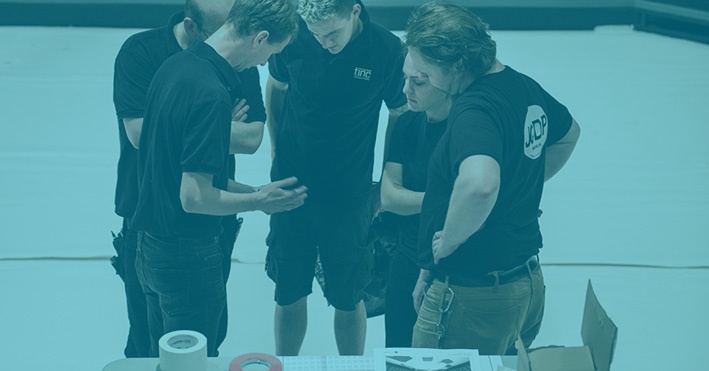
Over the past few weeks, we’ve had some fun tackling the various phases of event production. We’ve addressed what goes on during each period. We also created a checklist for event planning that takes all these concepts and gives you a way to put them into practice. So what, you might ask, could be missing? The truth is, being a production manager is more than just technical duties. There are some intangibles that, if done well, turn a good manager into an exceptional one.
1. You Set the Emotional Tone
A production or event manager is responsible for the smooth execution of an event. Obviously, this means knowing your technical stuff. But it also means knowing how to manage the people who are on your site. How do you behave? What kind of attitude do you bring to work? Even your posture can convey how you are thinking and feeling. Take a moment and put yourself in a crew person’s position. You show up for a load-in and everything seems to be set up and operating smoothly. It looks like it’s going to be a good day, right? Then, the production manager comes storming up to you, aggressively demanding to know where you parked and if you bring your paperwork. Even informing you that breaks today are going to be rigidly timed. Suddenly, the day doesn’t seem bright anymore, does it? And this has everything to do with how the production manager interacts with the team. Sure it may get the job done, but is it the manner best suited for a positive work environment? Not likely.
Managers are hugely influential in setting the tone of a project. Many studies have shown that we are greatly influenced by the emotions expressed by others around us. Here’s a neat, short video from the folk’s at PBS Studios’ BrainCraft. The key point: if you are frantic and frowning chances are your crew will mirror your behavior. Gather everyone together for a brief pow-wow to start the day and set the right tone immediately.
2. You Represent your Business
Full-time employee or freelancer: always keep an eye on the long term. What does this mean? The actions you take affect your career as a whole, not just this one project. You don’t start from zero every time. You carry your history with you, so make it something you are proud to shoulder. Make sure employee paperwork is filled out properly so you can ensure your people are paid in a timely fashion. Take care of the venue. Treat everyone as if he or she could be your next client. This is a word-of-mouth industry. So many of my gigs have come through personal recommendations. Help yourself by helping others. Be positive, supportive, and respectful. It will come back to you tenfold.
3. You are a Teacher and a Mentor
None of us come into the industry knowing everything. Someone takes the time to show us the ropes or make suggestions about ways to do our jobs better. As we grow, we get busier. As we get busier, we likely have more stress to manage. When this happens, it can be difficult to make room for teaching and mentoring. But as we’ve discussed, this is a tight-knit industry. Everyone knows someone who knows you. You’ll likely work with the same people again and again. By sharing your knowledge today, you make everyone’s job easier down the line, including your own. The same thing goes for your clients. Clients often react to situations based on past experiences. Show them that event work can be much easier and even enjoyable. Who knows, maybe they’ll put on more events!
Your emotional intelligence, professionalism, and leadership is more than your skill with tools. It is your ability to create meaningful relationships that can sustain your work beyond this week or the next.
Do you have tips for managing an event team? Share them with us in the comments below!



